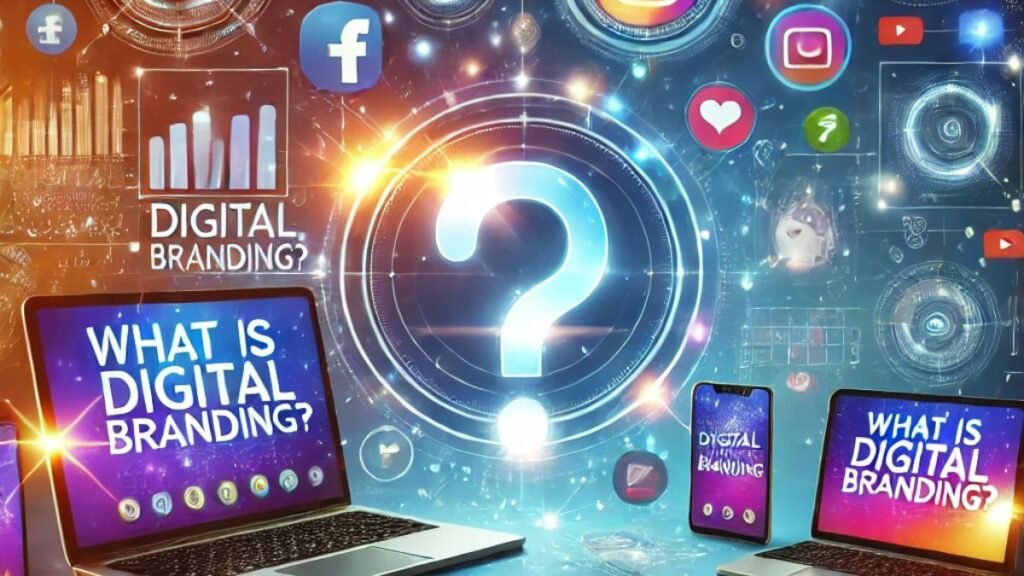Having a strong and noticeable online presence is essential in today’s fast-paced digital world. Your online branding has the power to either elevate or damage your career. Whether you are a professional looking to get ahead, a job seeker, or an entrepreneur, how you present yourself online can significantly impact your opportunities and career development. In this blog post, we will discuss digital branding, why it matters, how to build a strong online presence, and some best practices to follow.
What is Digital Branding?
Digital branding is managing your online identity and reputation through various digital platforms, such as social media, personal websites, and professional networks like LinkedIn. It’s the way you present yourself online, showcasing your skills, values, and expertise to your audience, potential employers, or business partners.

Your digital branding is often the first impression people have of you. It reflects your professional values, personality, and capabilities, which is why it’s crucial to put time and effort into creating a strong and consistent online presence.
Why Digital Branding is Important for Career Development
Your digital presence can have a significant impact on your career. Below are some reasons why building a strong online presence is essential:
Increased Visibility: In today’s job market, recruiters and employers often look online to find potential candidates. If you have an active and engaging online presence, your chances of being noticed increase. Whether it’s through a well-crafted LinkedIn profile, a personal blog, or a strong presence on industry-specific platforms, your visibility is key to your success.
Builds Trust and Credibility: A well-established online brand can help build trust with potential employers, clients, and partners. By consistently sharing valuable content, showcasing your expertise, and engaging with your audience, you demonstrate that you are reliable and knowledgeable in your field.
Networking Opportunities: Digital branding helps you connect with professionals and like-minded individuals from around the world. LinkedIn, Twitter, and other networking platforms give you access to communities and groups where you can engage in discussions, share insights, and expand your professional network.
Job Opportunities: Recruiters and hiring managers often search social media platforms and personal websites to identify potential candidates. By building a strong personal brand online, you increase the likelihood of being contacted with job opportunities that align with your skills and experience.
Professional Growth: Digital branding allows you to showcase your achievements, projects, and knowledge, which can lead to new learning opportunities. It provides a platform to demonstrate your skills and stay ahead in your industry.
How to Build a Strong Online Presence
Building a strong online presence requires strategy, effort, and consistency. Here are some steps you follow to establish and maintain a digital brand that supports your career development.
-
Define Your Personal Brand
Before you build your online presence, you need to understand who you are and what you want to portray to your audience. Defining your personal brand means identifying your values, and strengths, and the skills that make you unique. This will serve as the foundation for your digital presence.
Identify Your Core Values: What principles guide your professional life? Are you focused on innovation, teamwork, leadership, or creativity? Clarifying your values will help you express them consistently online.
Assess Your Strengths: Identify the skills that set you apart from others in your industry. Whether you have expertise in marketing, technology, or project management, highlight what makes you good at what you do.
Target Your Audience: Consider the type of audience you want to reach. Are you looking for a job, seeking clients, or looking to expand your network? Tailor your online content to appeal to that audience.

-
Create a Professional LinkedIn Profile
LinkedIn is one of the most powerful tools for building a professional online presence. A well-crafted LinkedIn profile not only highlights your skills and experience but also helps you connect with industry professionals, recruiters, and employers.
Optimize Your Profile: Include a professional photo, an engaging headline, and a well-written summary that showcases your career achievements, goals, and expertise. Make sure to list all relevant experience, skills, and certifications.
Build a Strong Network: Connect with colleagues, industry professionals, and recruiters. Join LinkedIn groups and participate in discussions to increase your visibility and demonstrate your expertise.
Share Relevant Content: Post industry insights, articles, and updates that demonstrate your knowledge and passion for your field. This shows potential employers and clients that you are engaged and up-to-date with industry trends.
-
Create a Personal Website or Portfolio
Having a personal website or portfolio is an excellent way to showcase your work, achievements, and skills. It can serve as an online resume and a place where potential employers or clients can learn more about you.
Choose a Domain Name: Your website’s domain name should reflect your name or professional brand. Choose a domain that is simple, memorable, and relevant to your career.
Showcase Your Work: Include a portfolio of your best work, whether it’s a collection of writing samples, designs, or projects you’ve managed. Providing real-world examples of your work helps validate your expertise.
Add your contact details: Ensure people can reach out to you effortlessly. Provide your email, phone number, and social media profile links to stay accessible.
-
Engage on Social Media
Social media platforms like Twitter, Facebook, and Instagram are essential for expanding your online presence. These platforms allow you to engage with your audience and share insights, news, and achievements.
Choose the Right Platforms: Not all social media platforms are equally effective for career development. LinkedIn is best for professional networking, while Twitter and Facebook can be used to share thoughts, articles, and industry trends.
Be Consistent: Post regularly on your chosen platforms to stay visible. Interact with professionals by liking, commenting on, and sharing their posts. Being consistent ensures you remain memorable to your audience.
Showcase Your Expertise: Share content that reflects your knowledge and skills. This can include blog posts, articles, industry news, and thought leadership content.
-
Monitor Your Online Reputation
Your digital brand is constantly evolving. Regularly monitor your online presence to ensure it aligns with your personal brand and career goals.
Google Yourself: Search your name on Google to see what comes up. If there’s anything you would prefer to keep private or remove, take the necessary steps to manage your online reputation.
Respond to Comments and Messages: Whether it’s on LinkedIn or your personal website, always respond to comments or messages in a timely and professional manner. This demonstrates that you are approachable and proactive.
-
Develop Your Content Strategy
Creating and sharing valuable content is an essential part of digital branding. Whether you’re writing blog posts, creating videos, or curating articles, content can help you establish authority in your field.
Start a Blog: A personal blog is a great way to share your insights, expertise, and career journey. It positions you as a thought leader and provides value to your audience.
Create Video Content: Video is becoming increasingly popular in digital branding. Consider starting a YouTube channel or posting short video updates on LinkedIn to showcase your personality and expertise.
Guest Post: Write articles for well-known industry websites or blogs. Guest posting is an excellent way to increase your exposure and build credibility.
-
Build Relationships with Influencers
Networking with influencers in your industry can help expand your reach and open doors for career opportunities.
Connect with influencers: Follow key industry figures and interact with their posts. Leave comments on their posts, share their work, and send them meaningful messages.
Collaborate: If possible, look for opportunities to collaborate with influencers on projects, podcasts, or webinars. Collaborating with established professionals can elevate your digital brand.
Key Takeaways
Digital branding is essential for career development in today’s digital world.
Building a strong online presence helps you increase visibility, build trust, and create networking opportunities.
LinkedIn, personal websites, and social media are key tools for developing a strong online presence.
Consistency, engagement, and sharing valuable content are crucial for maintaining a solid digital brand.
FAQ
- How do I maintain a positive digital brand?
Regularly update your profiles, share valuable content, engage with your audience, and keep your online reputation in check.
- How can I use LinkedIn effectively for career development?
Optimize your profile, build a strong network, share relevant content, and engage with others in your industry.
- Should I focus on one platform or multiple platforms for my digital brand?
It depends on your goals. Focus on platforms where your audience is most active, but it’s beneficial to maintain an active presence on multiple platforms.
- How can I measure the success of my digital branding efforts?
Track the engagement on your posts, monitor your website traffic, and measure the growth of your network. Feedback from colleagues or employers can also help assess your success.
Conclusion
Building a strong online presence is not an overnight task, but it is one of the most powerful tools for career development. By defining your personal brand, optimizing platforms like LinkedIn, creating valuable content, and engaging with others, you can create a digital brand that reflects your professional goals and aspirations. It’s a long-term investment in your career, and with consistency and effort, you will reap the benefits in the form of job opportunities, business growth, and professional recognition.